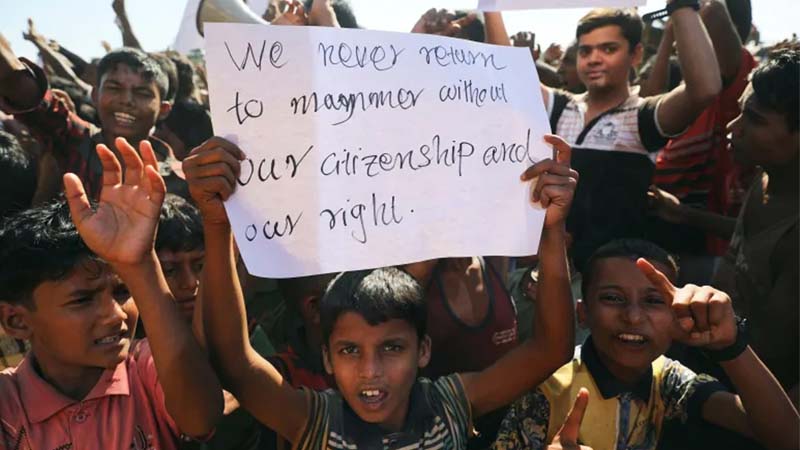Rohingya repatriation through peaceful negotiation


While addressing the 5th Summit of Conference on Interaction and Confidence Building Measures in Asia (CICA) held at Dushanbe, Tajikistan, President Abdul Hamid rightly said that if the Rohingya issue is left unresolved, the crisis can put peace and stability of the entire region at stake. Emphasizing the need for Rohingya repatriation through peaceful negotiation, the president solicited support and cooperation from CICA partners so that the forcibly displaced Myanmar nationals can return to their homeland with dignity.
Also, we are told that Rohingya crisis will be a major issue for discussion during Prime Minister Sheikh Hasina’s visit to China next month. Earlier, Prime Minister Sheikh Hasina accused Myanmar of being reluctant to take back over a million Rohingya nationals and feared that some international aid agencies want to keep the crisis alive as the issue itself is trapped into many strands of regional and international politics. The premier simultaneously feared that some international aid and voluntary agencies too were unwilling to resolve the crisis.
It needs no emphasizing that Bangladesh wants to resolve the Rohingya issue through peaceful negotiation, and the country expects similar reciprocity from Myanmar and international community. Dhaka has always been serious about a safe repatriation of the refugees. Unfortunately, Myanmar is spreading unauthentic and fabricated reports on the issue. What is more perturbing is that Myanmar is now showing zero interest in taking back its nationals. In such a situation, concrete intervention from international community to intensify pressure on Myanmar has become more pertinent to create a congenial environment for Rohingya repatriation.
Bangladesh is hosting over 1.2 million forcefully displaced Rohingyas in Cox’s Bazar district and most of them arrived there since August 25, 2017 after a military crackdown which has been termed as a ‘text book example of ethnic cleansing’ and ‘humanitarian catastrophe of unmanageable magnitude’. One of the consequences of hosting such a large number of refugees in such a small area is the deep negative imprint on the local people as well as the environment. That is where the need for a longer term, sustainable solution for the area comes, one which secures the safety and livelihoods of both those Rohingya people in fear for their lives, and the hosts who have given them sanctuary.
China can play a decisive role in Rohingya
repatriation by exerting its influence on
Myanmar and we expect that Prime Minister
Sheikh Hasina’s scheduled China visit in
next month will open up new possibilities for
Rohingya repatriation through peaceful negoti
ation. We hope international communities
would not condone Bangladesh paying the
price for being responsive and responsible in
showing empathy to a persecuted minority
population of a neighboring country
Bangladesh was lauded for its willingness to keep its borders open and welcome hundreds of thousands of refugees with open arms. But the situation in Cox’s Bazar – where the hundreds of thousands of mainly Rohingya refugees are living has gone from bad to worse. Are we paying the price for being responsive and responsible in showing empathy to a persecuted minority population of a neighboring country?
The international community, which has failed so far to put adequate pressure on the military junta in Myanmar to take their citizens back, should realise the dangerous effect of prolonged internment in camps. Bangladesh expects a more vigorous role of the international community in the diplomatic front to make Myanmar take back the Rohingyas.
In June 2018, the Bangladesh government signed a memorandum of understanding with the aim of facilitating the voluntary repatriation of Rohingyas back to Myanmar, but the prospect of actual returns is in question because of the previous experience of the Rohingya people in Myanmar. To ensure voluntary repatriations happen, full assurance is required that they will not be persecuted upon their return.
The military rulers in Myanmar have made every possible effort to thwart repatriation. Bangladesh has done the best it can in spite of its own multifarious constraints, and now it is time for the international community to do everything to help a persecuted ethnic minority return to the country they belong to. It has long been clear that the only way to get proper action from Myanmar’s generals and their civilian enablers is to compel it, through prosecutions of the offenders by the International Criminal Court, through sanctions, travel bans or a freeze on assets. It is crucial that the international community continues to maintain pressure on Myanmar to create a conducive environment so that the Rohingya refugees can return to their homeland with safety, security and dignity.
In this regard, China can play a decisive role in Rohingya repatriation by exerting its influence on Myanmar and we hope PM’s China visit in the next month will open up new possibilities for Rohingya repatriation through peaceful negotiation.
S H B Shuvro is a member of the Editorial Team of Bangladesh Post.



